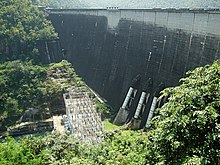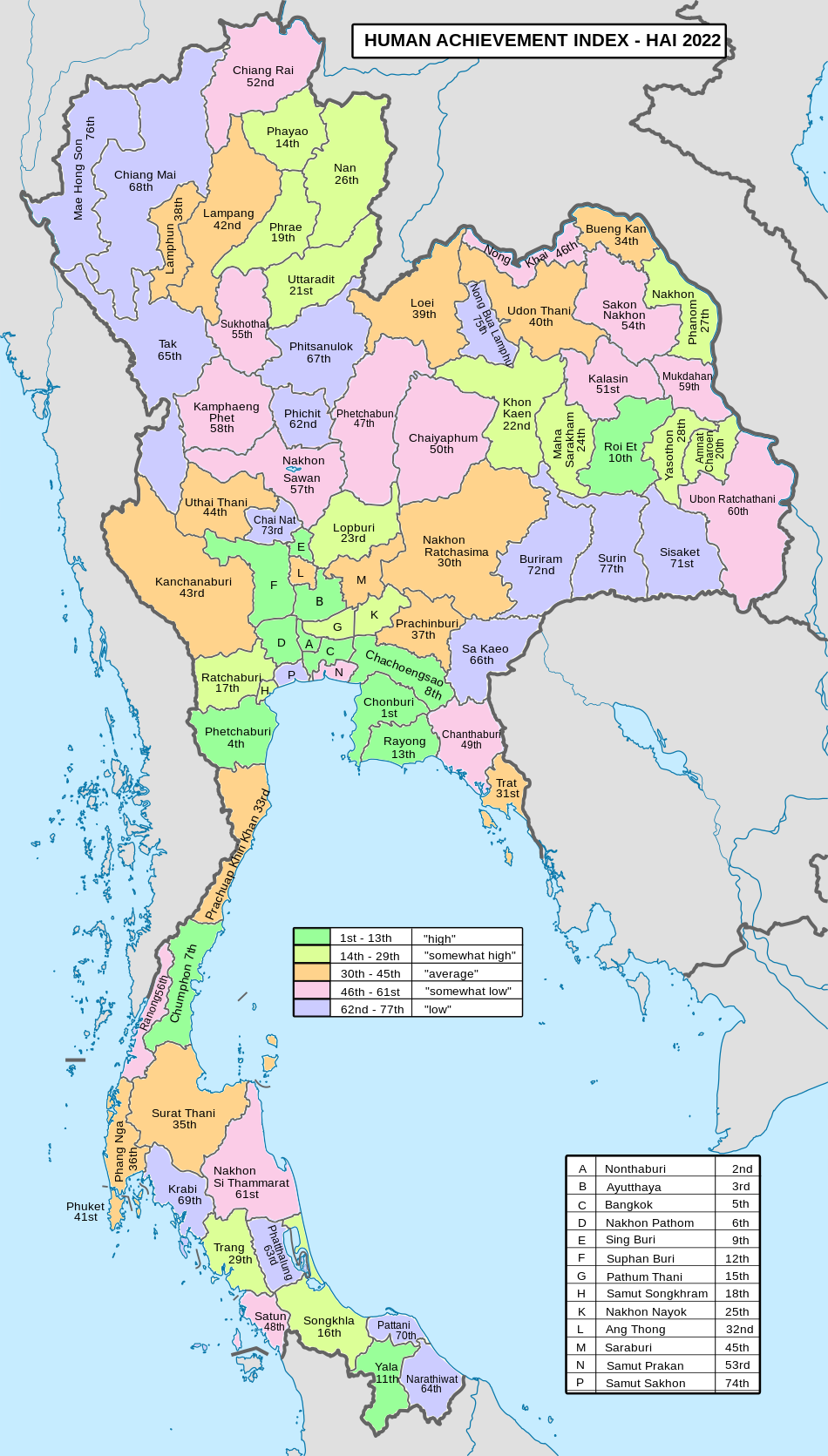Tak province
Tak
ตาก | |
|---|---|
| Motto(s): ธรรมชาติน่ายล ภูมิพลเขื่อนใหญ่ พระเจ้าตากเกรียงไกร เมืองไม้และป่างาม ("Nature worth seeing. The massive Bhumibol Dam. Brave King Taksin. The city of beautiful woods and forests.") | |
 Map of Thailand highlighting Tak province | |
| Country | Thailand |
| Region | Lower northern |
| Capital | Tak |
| Largest City | Mae Sot |
| Government | |
| • Governor | Chucheep Pongchai (December 2024) |
| Area | |
• Total | 17,303 km2 (6,681 sq mi) |
| • Rank | Ranked 4th |
| Population (2019)[2] | |
• Total | 665,620 |
| • Rank | Ranked 39th |
| • Density | 39/km2 (100/sq mi) |
| • Rank | Ranked 76th |
| Human Achievement Index | |
| • HAI (2022) | 0.6229 "low" Ranked 65th |
| GDP | |
| • Total | baht 48 billion (US$1.7 billion) (2019) |
| Time zone | UTC+7 (ICT) |
| Postal code | 63xxx |
| Calling code | 055 |
| ISO 3166 code | TH-63 |
| Website | www |
Tak (Thai: ตาก, pronounced [tàːk]) is one of Thailand's seventy-seven provinces (changwat) and lies in lower northern Thailand. Neighbouring provinces are (from north clockwise) Mae Hong Son, Chiang Mai, Lamphun, Lampang, Sukhothai, Kamphaeng Phet, Nakhon Sawan, Uthai Thani and Kanchanaburi. The western edge of the province has a long boundary with Kayin State of Myanmar (Burma).
Geography
[edit]
The Bhumibol Dam (named after King Bhumibol Adulyadej, the old name was Yanhee Dam) is in Khao Kaew Tambon (sub-district), Sam Ngao District of Tak and was built from 1958 to 1964.[5] It stops the river Ping, one of the two sources of the Chao Phraya River.[6][7][8] The artificial lake created covers an area of 300 km2 and is the largest in Thailand. Taksin Maharat National Park, Namtok Pha Charoen National Park, Lan Sang National Park, and Khun Phawo National Parks are all in the province. Thungyai Naresuan Wildlife Sanctuary shares half of the lake front with Kanchanaburi and Huai Kha Khaeng Wildlife Sanctuary at the border with Uthai Thani and are World Heritage Sites.[9][10]
On the western side of Tak province the Tenasserim Hills meet the Dawna Range. One of the few transnational roads and cross-border points into Myanmar is at Mae Sot. Northwest of Mae Sot the main road on the Thai side skirts the border until it turns straight north towards Mae Hong Son.
Tak province occupies 17,303 km2 (6,681 sq mi) and lies 426 km north of Bangkok. The total forest area is 12,455 km2 (4,809 sq mi) or 72 percent of provincial area.[1]
National parks
[edit]Four national parks and two national parks (preparation), along with two other national parks, make up region 14 (Tak) of Thailand's protected areas.
- Namtok Pha Charoen National Park, 770 km2 (300 sq mi)[11]: 14
- Khun Phawo National Park, 397 km2 (153 sq mi)[12]: 115
- Doi Soi Malai National Park, 355 km2 (137 sq mi)[11]: 17
- Mae Moei National Park, 185 km2 (71 sq mi)[12]: 92
- Taksin Maharat National Park, 149 km2 (58 sq mi)[12]: 38
- Lan Sang National Park, 104 km2 (40 sq mi)[12]: 15
Wildlife sanctuary
[edit]There area a total of five wildlife sanctuaries, four of which are in region 14 (Tak), but Tham Chao Ram is not in Tak province and Omkoi is in region 16 (Chiang Mai) of Thailand's protected areas.
- Umphang Wildlife Sanctuary, 2,590 km2 (1,000 sq mi)[13]: 7
- Thung Yai Naresuan East Wildlife Sanctuary, 1,517 km2 (586 sq mi)
- Omkoi Wildlife Sanctuary, 1,224 km2 (473 sq mi)[13]: 4
- Mae Tuen Wildlife Sanctuary, 1,173 km2 (453 sq mi)[13]: 6
History
[edit]Tak was a historical kingdom built over 2,000 years ago, even before the Sukhothai period. The ancient kingdom had its peak around the 1st century. By the 5th century the capital of this kingdom was moved south to Lavo (present day Lopburi province). A city named Ban Tak was established by Jamadevi (พระนางจามเทวี), princess of the Lavo kingdom, around 663 CE. It became part of the Sukhothai kingdom through battles led by Ramkhamhaeng the Great and formed the main fortress on the western front. The city was moved further west and renamed Mueang Rahang when the Ayuthaya kingdom was lost to Burma during King Maha Thammaracha's reign. The city was moved back to the east side of the Ping River during the early Bangkok period.[14]
King Taksin was vice-governor of Tak before the Ayutthaya kingdom fell during the war with Burma. As his name was Sin, he became called Tak-Sin during his time in Tak.[15]
Demographics
[edit]About a quarter of the population belongs to one of Thailand's tribe hill tribes: Yao, Karen (Thai Kariang), Akha (Thai Akha), Lahu (Thai Musoe), Hmong (Thai Mong), and Lisu (Thai Lisaw).[16] The largest tribe in Tak is Karen.[17]
Refugees
[edit]According to the UNHCR data of 2008, nearly 95,000 of Thailand's 121,000 registered refugees from Burma are housed in several refugee camps in Tak province of which Mae La camp is the largest with around 45,000 Karen refugees.[18]
Administrative divisions
[edit]
Provincial government
[edit]The province is divided into nine districts (amphoes). These are further divided into 63 subdistricts (tambons) and 493 villages (mubans).
Local government
[edit]As of 26 November 2019 there are:[19] one Tak Provincial Administration Organisation (ongkan borihan suan changwat) and 19 municipal (thesaban) areas in the province. Mae Sot has city (thesaban nakhon) status. Tak has town (thesaban mueang) status. Further 17 subdistrict municipalities (thesaban tambon). The non-municipal areas are administered by 49 Subdistrict Administrative Organisations - SAO (ongkan borihan suan tambon).[2]
Symbols
[edit]The provincial seal shows King Naresuan on the royal elephant.[20] Sometimes below the elephant a garuda is depicted, as the garuda is the state symbol of Thailand. King Naresuan is shown pouring consecrated water on the ground, a symbolic act to declare independence. This refers to the war of 1584 with Burma, when Tak was the first border town to be liberated from Burmese control.
The provincial slogan is, "A town of wonderful nature, huge Bhumiphol Dam, King Taksin The Great and beautiful forests".[20]
The provincial tree is the Asian Jatoba (Xylia xylocarpa var. kerrii), and the provincial flower is the Orchid tree (Bauhinia sp.). The cyprinid fish Hypsibarbus malcolmi is the provincial aquatic life.
Health
[edit]There are two main public hospitals in Tak: Somdejphrajaotaksin Maharaj Hospital and Mae Sot Hospital, both operated by the Ministry of Public Health.
Economy
[edit]
Agriculture is a major part of the Tak economy. The province of Tak produces rice, corn, vegetables, fruits, beef, tilapia, and other foods. Industries in Tak include granite quarrying and jewelry. Zinc mining was formerly conducted in Mae Sot District.[21]
Handicrafts and Myanmar products are also important for trade. The Bhumibol Dam in the northern part of Tak is its most popular tourist attraction. Tourism, especially ecotourism, in the southern part is seasonal with popular destinations such as the Thi Lo Su Waterfall, Thi Lo Le Waterfall, hiking and white water rafting in its various forest reserves. Tak is also known for its Loi Krathong festival where krathong sai (กระทงสาย) consisting of many krathongs are floated in a long line down the river.[22] The Loi Krathong festival is held on the Ping River in Mueang Tak District on Loi Krathong night.
Transportation
[edit]
Roads
[edit]Tak is a key communication and transportation centre of the north, with three Asian highways passing through the province. AH1 enters through the Myanmar-Thai border at Mae Sot District[23] AH2 passes through the province from north to south. Also AH16 terminates at Tak.
Air
[edit]Tak province is served by Tak Airport.
Human achievement index 2022
[edit]| Health | Education | Employment | Income |
| 67 | 74 | 8 | 68 |
| Housing | Family | Transport | Participation |

|
 |

|
|
| 2 | 2 | 76 | 49 |
| Province Tak, with an HAI 2022 value of 0.6229 is "low", occupies place 65 in the ranking. | |||
Since 2003, United Nations Development Programme (UNDP) in Thailand has tracked progress on human development at sub-national level using the Human achievement index (HAI), a composite index covering all the eight key areas of human development. National Economic and Social Development Board (NESDB) has taken over this task since 2017.[3]
| Rank | Classification |
| 1–13 | "High" |
| 14–29 | "Somewhat high" |
| 30–45 | "Average" |
| 46–61 | "Somewhat low" |
| 62–77 | "Low" |
| Map with provinces and HAI 2022 rankings |

|
References
[edit]- ^ a b "ตารางที่ 2 พี้นที่ป่าไม้ แยกรายจังหวัด พ.ศ.2562" [Table 2 Forest area Separate province year 2019]. Royal Forest Department (in Thai). 2019. Retrieved 6 April 2021, information, Forest statistics Year 2019, Thailand boundary from Department of Provincial Administration in 2013
{{cite web}}: CS1 maint: postscript (link) - ^ a b รายงานสถิติจำนวนประชากรและบ้านประจำปี พ.ส.2562 [Statistics, population and house statistics for the year 2019]. Registration Office Department of the Interior, Ministry of the Interior. stat.bora.dopa.go.th (in Thai). 31 December 2019. Retrieved 26 February 2020.
- ^ a b "ข้อมูลสถิติดัชนีความก้าวหน้าของคน ปี 2565 (PDF)" [Human Achievement Index Databook year 2022 (PDF)]. Office of the National Economic and Social Development Council (NESDC) (in Thai). Retrieved 12 March 2024, page 30
{{cite web}}: CS1 maint: postscript (link) - ^ "Gross Regional and Provincial Product, 2019 Edition". <>. Office of the National Economic and Social Development Council (NESDC). July 2019. ISSN 1686-0799. Retrieved 22 January 2020.
- ^ "Bhumibol Dam". Rid Go Th. Archived from the original on 17 September 2008. Retrieved 2008-07-20.
- ^ "Royal Irrigation Department River Gauges Report". RID Stations. 2002. Archived from the original on 14 August 2009. Retrieved 2008-07-20.
- ^ "Chao Phraya River Basin (Thailand)". World Water Assessment Programme. Archived from the original on 8 June 2008. Retrieved 2008-07-20.
- ^ "Detailed Map of the Chao Phraya River Basin (Thailand)". World Water Assessment Programme. Archived from the original on 18 September 2008. Retrieved 2008-07-20.
- ^ "Thung Yai Naresuan Wildlife Sanctuary". United Nations Environment Programme - World Conservation Monitoring Centre. March 1991. Archived from the original on 2008-07-18. Retrieved 2008-07-21.
- ^ "Huai Kha Khaeng Wildlife Sanctuary". United Nations Environment Programme - World Conservation Monitoring Centre. March 1991. Archived from the original on 2008-07-18. Retrieved 2008-07-21.
- ^ a b "ข้อมูลพื้นที่อุทยานแห่งชาติ (เตรียมการ) 22 แห่ง" [Information of 22 National Parks Areas (Preparation)]. Department of National Parks, Wildlife and Plant Conservation (in Thai). December 2020. Retrieved 1 November 2022.
- ^ a b c d "ข้อมูลพื้นที่อุทยานแห่งชาติ ที่ประกาศในราชกิจจานุบกษา 133 แห่ง" [National Park Area Information published in the 133 Government Gazettes]. Department of National Parks, Wildlife and Plant Conservation (in Thai). December 2020. Retrieved 1 November 2022.
- ^ a b c "ตาราง 5 พื้นที่เขตรักษาพันธุ์สัตว์ป่า พ.ศ. 2562" [Table 5 Wildlife Sanctuary Areas in 2019] (PDF). Department of National Parks, Wildlife Sanctuaries and Plant Conservation (in Thai). 2019. Retrieved 1 November 2022.
- ^ "General Information - Tak". North of Thailand. Archived from the original on 12 June 2015. Retrieved 2008-07-21.
- ^ "King Taksin the Great". Wangderm Palace. 2003. Archived from the original on 2002-08-10. Retrieved 2008-08-02.
- ^ "Travel Thailand: The Twilight That Tak Province". Thailand Live. Archived from the original on 2012-11-29. Retrieved 2008-08-04.
- ^ "Mountain-Biking and Trekking in Northwest Thailand". Thai Cycling. Archived from the original on 30 March 2009. Retrieved 2008-08-04.
- ^ "Myanmar Thailand Border: Refugee Population By Gender". The UN Refugee Agency. 2008-04-01. Retrieved 2017-11-16.
- ^ "Number of local government organizations by province". dla.go.th. Department of Local Administration (DLA). 26 November 2019. Retrieved 10 December 2019.
16 Tak: 1 PAO, 1 City mun., 1 Town mun., 17 Subdistrict mun., 49 SAO.
- ^ a b "General Data". Tak province. Retrieved 18 May 2015.
- ^ Wipatayotin, Apinya (14 November 2018). "Cadmium-sickened villagers awarded B16m compensation". Bangkok Post. Retrieved 14 November 2018.
- ^ "Loy Krathong Sai". Tourism Authority of Thailand (TAT). Retrieved 18 May 2015.
- ^ "Mae Sot Thailand". Thaipro. Retrieved 2008-07-31.[dead link];
External links
[edit] Tak travel guide from Wikivoyage
Tak travel guide from Wikivoyage







